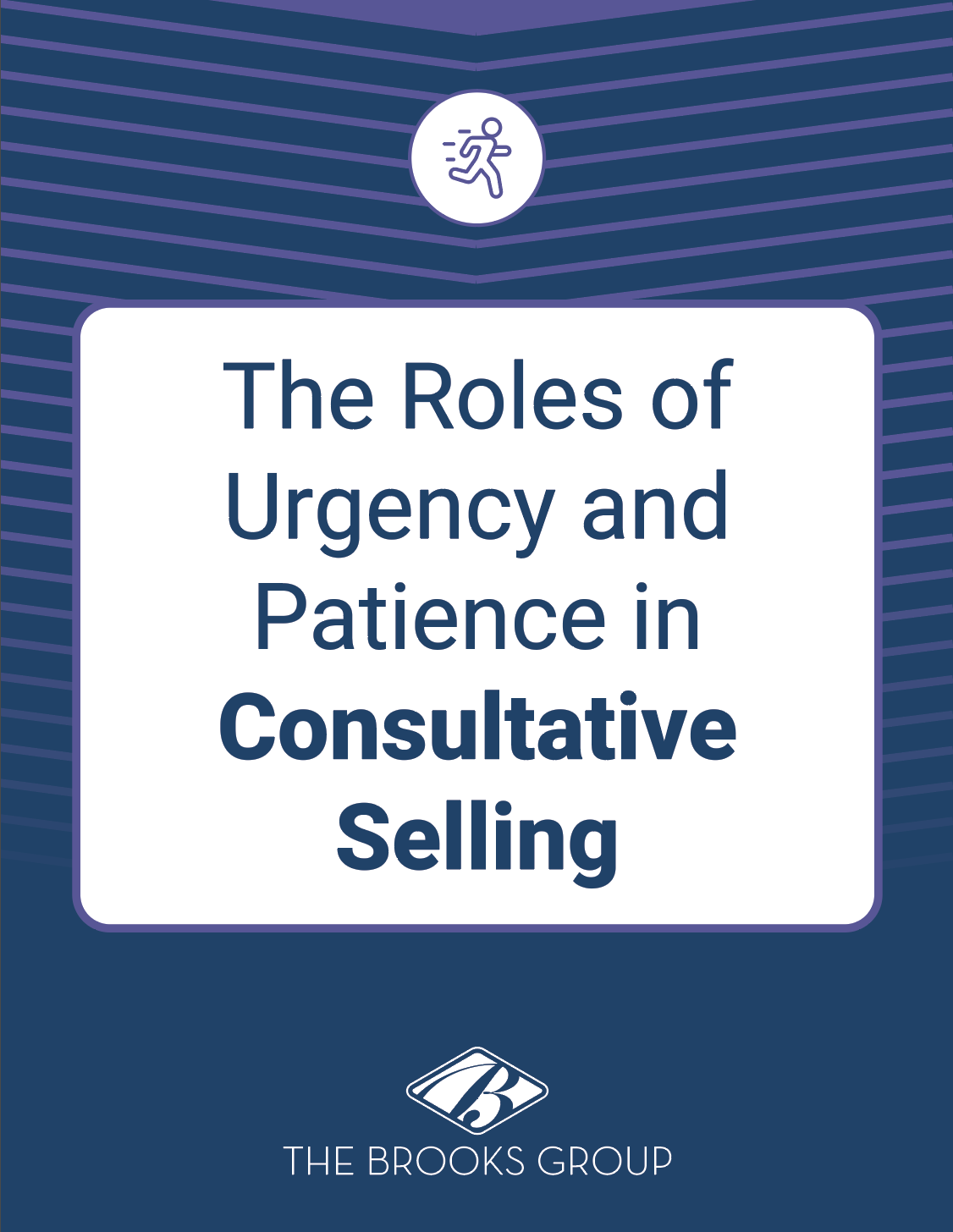Procurement managers have a reputation for focusing only on price. Is this deserved? Or can sales professionals engage purchasing managers, buyers, and agents differently to have more success selling to them?
This post describes how you can use a consultative selling approach to understand the unique buying agenda of procurement managers and sell more effectively.
What Is a Consultative Selling Approach?
Each type of buyer may have very different reasons for purchasing the same product or service. That’s why using a consultative selling approach is critical.
Sales professionals who practice consultative selling are more like trusted advisors than traditional salespeople. Instead of pushing a specific product, sales professionals use a consultative sales process, ask open-ended questions, and actively listen to uncover needs and pain points before recommending a solution.
Buyers generally make up their minds in the first few seconds whether the time spent with you is going to be valuable. You need to show that you understand their perspective, can speak their language, and are tuned in to their wants and needs.
Consultative selling means understanding each prospect’s unique motivation so you can present your product or service in the way your prospect wants to perceive it. This makes it far more likely they will listen to you—and that you’ll make the sale.
It’s important that you keep in mind the need to understand your prospects’ situations—not only what they’re trying to accomplish but also their internal company situation. This internal reality often drives their buying motives.
Sales professionals who sell in a way that reflects their understanding of this concept will see more success and ultimately close more sales.
Understanding Procurement Manager Challenges
Procurement managers are in a unique position. They make buying decisions about products and services they don’t personally use. They have to understand specific criteria for each new purchase, how it will be used, who will use it, and how it will benefit the company.
They’re under a lot of time pressure and budget stress. They have to make the best decision and, if something goes awry, they might bear the blame. Their ultimate goal is to save the company money while making end-users happy—and they might feel caught in the middle.
Sales professionals often perceive procurement managers as excessively demanding or even unreasonable. But a deeper look at this type of prospect reveals that their demands may simply be the result of the pressures they face in making buying decisions for their organizations.
Showing genuine interest, building trust, and asking probing questions to find a solution to their problems is a better strategy.
5 Consultative Approaches When Selling to Procurement Managers
Here are five techniques to help you sell more effectively to procurement managers:
1. Understand Their Personal Agenda
As you approach prospects who are procurement, purchasing, or buying managers, it’s important to realize their perspective. They represent the company in making purchasing decisions. They must request and assess proposals, analyze large quantities of information, and choose the best option.
In some cases, they may not have a clear understanding of exactly what is needed. They may not have the technical background to evaluate all products they buy. They end up negotiating with sales professionals and with stakeholders and decision-makers in their own organization.
But the real struggle for a procurement manager may have more to do with being a “go between.” The “go between” role can create a no-win situation. While they often feel overlooked and undervalued, they also bear the brunt of blame whenever there’s a problem with a purchase.
Most express a sense of frustration that, while they rarely get praised, they’re sure to hear plenty of criticism if there’s an issue.
And as corporate buying groups get larger, procurement managers may be joined by executives and department heads. This complicates the buying process and can slow purchasing decisions.
What does this mean for the sales professional? These prospects are likely to have a personal buying agenda that includes:
- Products that are easier to understand and not overly technical
- Products with a clear value proposition for the organization
- Reliable service and delivery
- Safe, dependable products
- Recognition for their contribution to the organization
Sales professionals often claim that procurement managers are so obsessed with price that they seem to place little importance on quality or value. However, there is evidence to suggest that something else is going on.
Useful product life, anticipated benefits, compatibility, upgrade ability, and several other factors can outweigh the issue of price. In other scenarios, on-time delivery can supersede price as the major buying criterion.
Procurement managers studied in “lowest price” environments admitted to adjusting their specifications to award a favored provider whose price wasn’t the lowest.
When asked what made a provider “favored,” the factors appearing again and again were “sincerity,” “making the procurement manager feel respectable and important,” “a lack of technical obsession,” and “patience.”
Your ability to sell to procurement managers may hinge on how you treat them. You must satisfy the prospect’s agenda as well as meet their desired product specifications.
With this perspective in mind, a consultative selling question to use with a procurement manager might be something like:
My sense is that finding solutions that are reliable and not overly technical is important to you. You probably want to make buying decisions that will contribute to your company’s success. To see if we can help you achieve that, do you mind if I ask you a few questions?”
2. Position Your Product or Service
The desire for a sales professional who is “sincere” and “patient” illustrates that this type of potential customer may feel vulnerable during the buying process.
This may derive from a lack of specific expertise with your product or service. Depending on the variety and volume of products they’re responsible for procuring, they may not understand each one enough to feel truly confident.
However, they are in a position of power because they issue purchase orders. It’s crucial that procurement managers perceive any product or service they buy as being “easy to understand.”
With this in mind, you’ll want to position your product or service using phrases similar to these:
- “Easy to understand”
- “Not technically challenging”
- “Doesn’t require a lot of technical education”
- “A solid and safe purchase”
Here’s a sample positioning statement:
“Let me stress that our product is easy to understand. It’s not technically challenging and it certainly represents a solid and safe purchase.”
3. Position Your Organization
For reasons that are both real and perceived, procurement managers often consider sales professionals as “less than sincere” from the outset. They may have their guard up because they have dealt with some sales professionals who tried to manipulate them.
This is the opposite of a consultative sales approach. You have an opportunity to reset expectations and lead the conversation in a new and more welcome direction—away from the traditional “sales pitch.”
Prospects who deal from a position of strength, such as entrepreneurs and CEOs, rarely worry about how sincere you are. Yet sincerity is very important to the procurement manager because they are skeptical of the selling process and may harbor a fear that they’re not quite up to the task.
Because they don’t always have extensive understanding of what they’re buying, procurement managers must rely on your authenticity. Your patience is a vital ingredient in building a long-lasting customer relationship.
There are two important pitfalls to avoid here:
Resist the temptation to instruct prospects about the technical details of your product.
Remember, your prospect doesn’t want to become a technical expert on your product or service. They simply want to know enough to make an educated choice and avoid embarrassing mistakes.
Don’t come across as being more interested in your products than in the prospect.
When talking about your organization to a procurement manager, always refer to your organization as “people.” You’ll position your company well if you create the perception that you’re a group of individuals and your competitors are anonymous organizations.
Use phrases like these to describe your organization:
- “Sincere”
- “We’re people who are more interested in our customers than in what we’re selling”
- “We’re people who aren’t obsessed with the technical details of our products”
- “Patient”
For example, here’s a provider positioning statement you might use when speaking to a procurement manager:
“Let me tell you a little about our company. We pride ourselves on being patient, not obsessed with the technical details of our products, and far more interested in our customers than in what we sell.”
4. Emphasize Product Benefits
When you’re selling to procurement managers, keep in mind that it’s far more common for this type of prospect to be recognized for poor performance than for good performance. For example, when a provider doesn’t deliver on time, the procurement manager who selected the provider will likely be blamed. A bad purchase is never hung on the user’s door—it’s always dropped right at the feet of the purchasing department.
As a result, one of the chief benefits the procurement manager seeks is the ability to avoid making mistakes. They generally need a tremendous amount of decision-making certainty to avoid coming under fire.
With this in mind, you might want to position the benefits of your product or service in the following terms:
- “Things should run smoothly for you”
- “Quietly”
- “No crises”
- “Decisions that are certain and sure”
Here’s an example of a benefit positioning statement that might appeal to a procurement manager:
“Our product will allow things to run smoothly for you. I guarantee that, with us, you can make decisions that are certain and sure.”
5. Position Price
Of all the prospect types, procurement managers probably have the most notorious reputation for price sensitivity. In reality, they personally care very little about how much you charge for your product or service. It matters only when it becomes an issue with their superiors or the finance department.
Some procurement managers will go out of their way to do business with the provider they favor. But that can only happen when your price is comparable to that of your competitor’s or—if it’s higher—when it can be translated into benefits that justify paying the higher price.
You’ll want to position your price with terms like these:
- “Directly related to the benefits you’ll receive”
- “Justified by the benefits”
- “Easily translated into the benefits you get”
You might position the price of your product or service by saying something like:
“Let me emphasize that the price for our product is directly related to the benefits you’ll receive. In fact, it is more than justified by those benefits. I’d also like to make sure you understand everything it includes…”
How Consultative Sales Training Can Help
The key to successful consultative selling is keeping a strong customer focus throughout the entire sales process. That focus creates a win-win situation where the buyer feels supported in having their challenge solved, and the sales professional gains a loyal, long-term customer. The right sales training can help your team adopt this modern approach.
IMPACT Selling® is a buyer-focused, consultative selling process used by B2B sales teams around the world. Consultative selling skills training helps sales professionals connect with buyers and communicate the value of their product and services—solving challenges for the customer while increasing sales revenue.
Learn More
Get more consultative selling strategies for your sales team here: The Top 7 Consultative Sales Approach Strategies for Your Sales Team
White Paper Download
The Roles of Urgency and Patience in Consultative Selling
Emerging technology and unlimited access to information have changed the sales landscape—putting buyers more in control than ever before. These changes require your salesforce to transition to a consultative selling approach, or get left behind.





